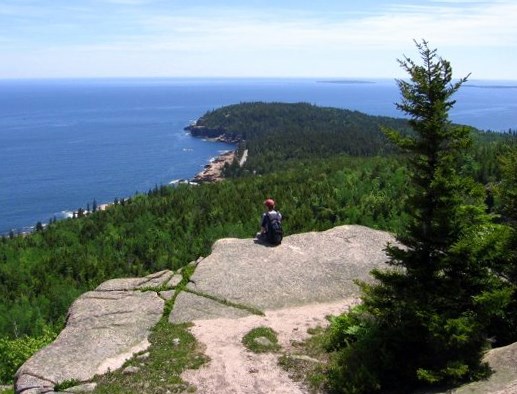Download the complete Acadia National Park Climate Change Scenario Planning Workshop Summary [5.3 MB PDF]

- Four major themes came up in all scenarios and types of park decisions (infrastructure, staffing, and ecosystem management): the need to improve (1) emergency response plans for extreme events, such as hurricane, wind storm, or fire; (2) proactive planning for multiple plausible futures (i.e., scenarios); (3) flexibility in staffing, budgeting, management practices, and ability to respond to extreme events; and (4) engagement with community members in dialogue, planning, and implementation of management practices related to emergency response, infrastructure, and ecosystem management.
- Climate is only one source of uncertainty facing Acadia. The park also faces uncertainties about budgets, land use, visitor behavior, etc. Together these uncertainties complicate and constrain the park’s ability to plan. These additional uncertainties could be addressed explicitly in future scenario planning exercises, which could make the scenarios more realistic and divergent from each other.
- Each of the climate scenarios indicated a more difficult future for park managers than occurred in the past. Participants focused a lot on constraints limiting their ability to be as flexible and proactive as the scenarios (and even current conditions) require. Participants spent less time on opportunities that a changing climate (and other future developments) might present; park staff will want to consider these opportunities more as they develop plans.
- The implications for staffing, infrastructure, and ecosystem management were similar across each of the scenarios. This can indicate that the scenarios are not sufficiently divergent from each other. However, it can also indicate that the groups generated 'robust' or high-level approaches that are genuinely appropriate across a wide variety of plausible scenarios. We expect that both factors contributed to the similarity in implications and responses.
- The workshop highlighted that Acadia benefits from very strong partnerships and friends. Even so, the need to engage communities even more was emphasized. The questions arose: Are we set up to do engage in the way and to the degree required? Would it require a culture shift?
- The scenario planning process itself provides an opportunity to engage with more park staff and other stakeholders and community members. There are opportunities to use scenario planning and relevant climate science at upcoming local and regional adaptation planning events and other community forums.
Download the full report [PDF] to learn more about results from the workshop.
Last updated: September 24, 2019
